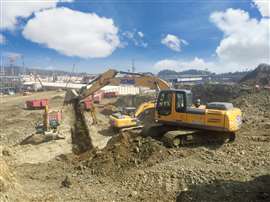Could US tariffs on Chinese goods endanger adoption of electric construction equipment?
12 June 2024

When news emerged last month that the US government would be raising tariffs on a wide range of Chinese goods, including electric vehicles and batteries, it wasn’t immediately obvious whether this would apply to construction equipment.
But specialist forecasting consultancy Off-Highway Research has confirmed that the increases will indeed apply.
And it has warned that the move could impact the already-slow adoption of electric machines in the US.
The majority of electric construction equipment is produced in China, where manufacturing operations generally sit close to China’s vast battery supply chain ecosystem.
Most machines are also sold into the Chinese market, many of them wheeled loaders for quarry and mining operations, according to Off-Highway Research’s managing director Chris Sleight, who is overseeing the production of a new report on the international sales and production levels of electric construction equipment.
Uptake of electric machines of all kinds, ranging from cars, to buses, trucks and construction machinery is increasing in China as the government puts on pressure to drive up air quality and reduce carbon emissions.
China’s rapid electrification has helped to bring down the cost of electric construction machines to the point where, Sleight estimates, electric wheeled loaders are roughly in line with the cost of diesel machines in the domestic market.
It’s a different story in many other parts of the world, including Europe and the US, however, where he estimates that electric construction equipment is still two to three times the cost of diesel equivalents. And that high cost continues to depress sales of electric machines outside of China.
“One of the things our research shows is that the number of electric machines sold in Europe and North America is quite low, even in markets where there is a green agenda, and it is largely limited to compact equipment,” Sleight says.
“The industrial production of electric machines by Western household name manufacturers is very small – certainly less than 2,000 machines last year around the world.”
‘Thin economic argument gets thinner’
“The whole argument about adopting an electric machine is yes, it’s more expensive, but the total cost of ownership is lower so the machine pays for itself over time. That’s based on electricity being cheaper than diesel, as well as on low maintenance costs. It’s a stronger argument in Europe where taxes on fuel have historically been higher than in North America,” says Sleight.
What makes that economic argument more difficult to make, even before the application of higher tariffs on Chinese machines, is the fact that rental companies tend to be major buyers of compact equipment, which make up the majority of electric machines available in the US market.
“Total cost of ownership is less persuasive for rental companies because they aren’t paying those costs,” asserts Sleight. “The maintenance? Yes, maybe. But with mini excavators you are talking about machines that run for a couple of hundred hours a year and are probably never going to need a major overhaul.”
Electric machines may still appeal if they need to be used for specific applications like indoors or on tunneling projects.
“But it is hard to make the economic argument for these machines that are low utilization. You have to have them for a long time to make the total cost of ownership argument,” says Sleight.
Tariffs, he warns, could make a difficult economic argument even harder to make. “It will have a very big impact on the adoption of electric equipment in North America because the tariff on Chinese-made machines – regardless of brand - is going from 25% to 100%. That means the purchase price will increase by 60%. It makes a thin economic argument very much thinner,” he warns.
Construction Briefing contacted several major Chinese OEMs as well as major western manufacturers Caterpillar and JCB but all declined to comment. Volvo Group was not available to comment before this article was published online.





